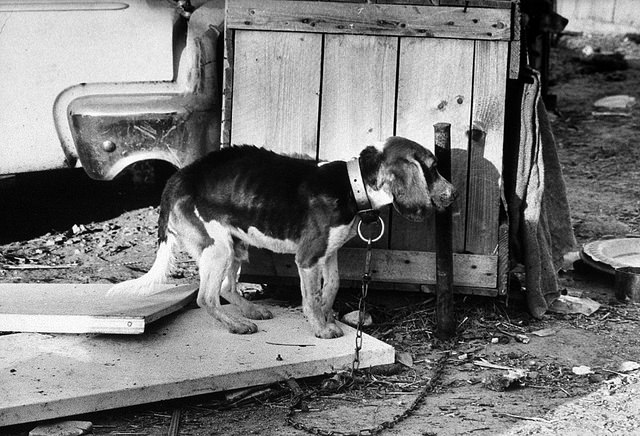Do you suspect an animal in your area is not being cared for properly? Want to do something, but you’re afraid of making your neighbor mad or not following the law correctly, which can sometimes make the situation worse? Every animal lover should know what to do to help save an animal that is not being treated well.

The following are the steps recommended by the Humane Society of The United States (HSUS).

Know The Signs
The first step is knowing the signs that an animal is being abused. The following is the list of signs the HSUS says to look for:
–Hoarding: A person who keeps far more animals than they can properly care for is a hoarder.
–Lack of veterinary care: Untreated wounds are a red flag that demand immediate attention; emaciation, scabs and hair loss can also be signs of underlying untreated diseases.
-Inadequate shelter: Especially in extreme heat or cold temperatures, this can be deadly to pets.
–Chained dogs: dogs who are tethered continuously suffer tremendously, both from social isolation and exposure to predators and the elements.
–Abandonment: A startling number of animals die every year when people move out of their residences and simply leave the animals behind. Sometimes, an abandoned dog’s barking or cat’s howling can alert the neighbors, but it’s wise to keep an eye on a recently vacated home, especially if the former residents moved suddenly.
-Hurting the dog: Any violence including beating or physically attacking an animal constitutes abuse.
Take Action
If you see any of the above, the HSUS says to contact authorities IMMEDIATELY. Time is imperative and a day can literally mean the difference between life or death.
But who do you contact?
Did you know you can call 911 to report animal abuse? YOU CAN!
You should also have the phone number(s) of local animal welfare groups with your other emergency contact information so you can call them quickly as well. You can also call your vet’s office, and they can likely point you in the right direction. Click here to find other resources right in your state. The HSUS recommends putting these numbers into your cell phone’s contacts, so you always have them with you.
If you don’t have an animal welfare agency and your local authorities are not equipped to handle cruelty cases, the HSUS urges you to email (crueltyresponse@humanesociety.org) or call them and report the incident. Again DO THIS AS SOON AS POSSIBLE.

Document
One of the most important things you can do, aside from actually reporting the suspected crime, is to keep detailed records of what you saw and when. This will make your case stronger and will aid in the investigation. Be sure you get a description of animals and people involved.
“Cell phone photos and videos have proven excellent tools in cementing criminal cases against animal abusers,” says the HSUS.
Non-Life Threatening Situations
If the animal is not in a life-threatening situation but you suspect neglect – for example, a dog that is never let out of a kennel or off of a chain – Animal Legal Defense Fund (ALDF) suggests approaching your neighbor and volunteering to help out. For example, offering to walk the dog or even helping place him in a home.

PLEASE, only do this if the situation is safe (for example, a well-meaning older person who just can’t take care of their dog any more). Otherwise, approaching them may cause more harm than good. Once they realize someone has noticed, they may take drastic measures up to and including disposing of the dog themselves. If the person becomes hostile, contact the authorities for your safety as well as the dog’s.
Know The Laws
Every state has different laws regarding animal cruelty. Learn the laws in your state so you can be better prepared to deal with authorities. You can look up your state at www.municode.com or check out ALDF’s state map of North America.
If you feel your state’s laws are not strong enough to protect the animals adequately (and many aren’t!) ALDF suggest you help strengthen them! Check out the ALDF’s Model Animal Protection Laws Collection as a great place to start.
